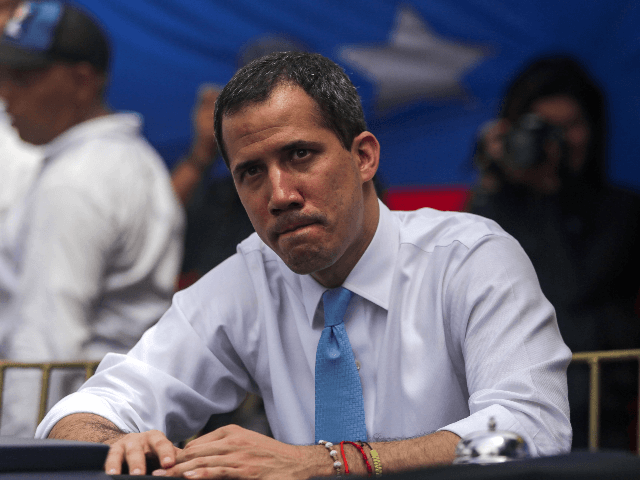More Venezuelans Think ‘Nobody’ Is Their Presi
Post# of 52075
< >

The Venezuelan polling firm Meganálisis published its monthly nationwide survey this week, finding that the looming spread of Chinese coronavirus in the country is corresponding to decreased faith in the legitimate president of the country, Juan Guaidó.
Guaidó is, by the rules of the constitution, president because dictator Nicolás Maduro’s last legal term ended in January 2019 and he refused to step aside. The National Assembly, the country’s legislature, has the power to appoint an interim president when a “rupture in the democratic order,” such as a president refusing to leave power when his term ends, occurs. The Assembly tasked Guaidó – its own president and a former member of the socialist Popular Will party – with that job, which gives him the paramount responsibility of organizing elections to put a president chosen by the people in power.
Yet Meganálisis found that most Venezuelans believe Maduro is the nation’s president, and more believe that “nobody” is the president of Venezuela than think Guaidó holds that title. The change is a stunning turnaround from the pollster’s May 2019 survey, which found most Venezuelans accepted Guaidó as their president.
The March Meganálisis survey, taken between March 2 and 13, found that 71 percent of respondents believed Maduro was the president of the country. Nearly a fourth, 23.7 percent, said “nobody” was the president, while only three percent identified Guaidó as head of state.
The May 2019 survey by the firm, one of the last to ask the question, found that the plurality of respondents, 49.8 percent, believed Guaidó was their president. Rather than “nobody,” 35.4 percent said they did not know who their own president was, and only five percent said it was Maduro.
While many appear resigned to have Maduro in power for the long term, most trust neither politician, though again nearly seven times the number of respondents said they trust Maduro than those who said they trust Guaidó. While 60.7 percent said they trust “neither,” 25.2 percent put their faith in Maduro, and only 3.8 percent in Guaidó.
Meganálisis only polled specifically trust for Guaidó in its February 2020 survey, finding a mild increase in trust from December in the aftermath of Guaidó attending President Donald Trump’s State of the Union Address. At the time, 63.8 percent said they did not “believe, trust and support” Guaidó, down from 68.5 percent saying they did not trust Guaidó in December. The poll did not show any support for Maduro’s socialist regime, however; nearly 80 percent said they wanted to see an end to the Maduro regime in February.
The precipitous dip in support for Guaidó, a relatively little-known member of the opposition when the National Assembly swore him into the presidency over a year ago, appears to be a product of Guaidó’s inability to dislodge Maduro from power, despite claiming to do so in an alleged military uprising in May. Guaidó took to social media for a live video in the early morning hours of May 1, 2019, and declared an end to the Maduro regime alongside formerly imprisoned head of the socialist Popular Will party, Leopoldo López. He claimed Maduro’s senior military leaders had defected and would arrest and remove the dictator from power. In the ensuing hours, the leaders Guaidó’s faction claimed had defected appeared on state television mocking Guaidó, standing alongside Maduro.
The only material benefit of the Guaidó uprising was the liberation of López, a progressive, Harvard-educated elite who claims to be a direct descendent of Simón Bolívar.
Guaidó followed up the “uprising” by agreeing to a series of highly unpopular “talks” with the illegitimate Maduro regime, squandering his popularity among Venezuela anti-socialists.
The March survey was taken before the Maduro regime revealed the first Chinese coronavirus case in the country on March 14, so questions on the pandemic yielded minimal concern. Most, 81.6 percent, said they believed Venezuela could overcome the pandemic, despite nearly 60 percent describing Venezuela’s healthcare system as “poor or very bad.” Nearly 90 percent, however, said they supported quarantine and social distancing measures to prevent the rapid spread of the highly contagious disease.
Venezuelans appeared split on the nature of the virus itself. A plurality, 44.7 percent, said they did not believe that it was a biological weapon – an unsubstantiated claim made by the Chinese government against the U.S. Army – while 42.1 percent said they did.
The Maduro regime, which international health organizations are deriving their information from despite it not being the legitimate government of Venezuela, claims it has confirmed 106 cases of coronavirus nationwide as of Thursday. Maduro’s response has largely been to promote alleged miracle cures for the virus, including claiming that Cuba had invented the protein interferon and sharing an herbal tea made of ginger and black pepper as an alleged cure for the virus. Twitter deleted a post with the latter information as it violated the terms of use of the site.
Guaidó has responded to the outbreak by attempting to launch a website the Maduro regime blocked access to.
 (0)
(0) (0)
(0)